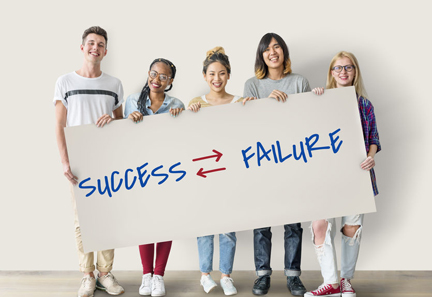By Evetta McGriff
No one likes to fail, and the fear of failure sometimes holds us back and stops us from reaching towards our dreams. Failure is defined by not meeting or achieving something, or not reaching a desired goal or outcome. The feeling of failure brings about negative emotions and we want to avoid it as much as possible. When you avoid failure, you are also avoiding success. No amount of success is achieved without some failure. Jack Canfield, the author of the Chicken Soup for the Soul series, said “Everything you want is on the other side of fear.” When Thomas Edison was trying to create the light bulb, he looked at his multiple attempts in a positive way. “I have not failed. I’ve just found 10,000 ways that won’t work.”
What we want to avoid are epic failures. These are the types of failures that we may not bounce back from or recover from quickly. Many successful people had failures in the beginning of their careers, but the failures weren’t so crippling that they didn’t try again. Some “successful failures” include Michael Jordan, Oprah Winfrey, Bill Gates, co-founder of Microsoft; author Stephen King, and Apple founder Steve Jobs.
If your career includes creating a product, you have to not only design a product that looks good, it needs to actually work. You can’t demonstrate it to others without testing it out several times. You probably won’t get it right the first time, and that’s okay. You have to learn from the mistake and keep trying until you get it right.
In life, the same rules apply. If you try out for a sports team, or audition for a role and you don’t get it, the best thing to do is not yell and scream and tell the coaches or producers they’ll be sorry for not choosing you. Instead, go over what you did in your head, and think about how you can be better the next time.
No one is perfect and we all make mistakes. We will also fail at some things. These mistakes and failures turn epic when we blame others, don’t own up to and accept responsibility for what happened, and when we don’t think before we act or speak. Posting angry messages on social media or sending email messages to complain will not help the situation. Henry Ford, the founder of Ford Motor Company believed “the only real mistake is the one from which we learn nothing.” Turn the perceived negative in your situation into a positive. Now that you’ve done it wrong the first time, or first few times, use what didn’t work and turn it into a success.



